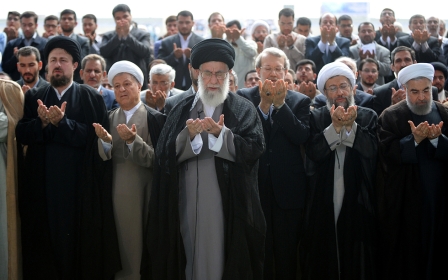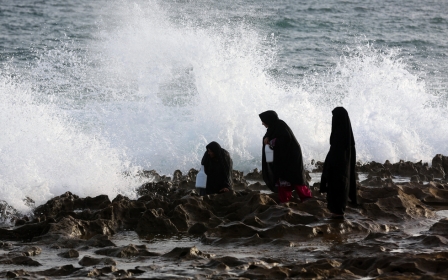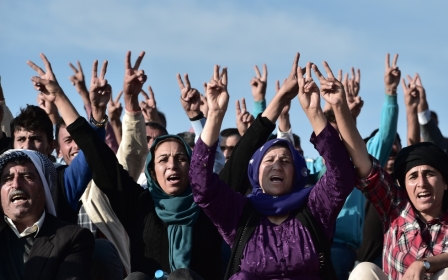Iranian exiles embrace Israel’s drive against nuclear deal

Ever since the Vienna nuclear agreement between Iran and P5+1 - the five permanent members of the United Nations Security Council plus Germany - was announced on 14 July, the opponents of the agreement have been waging a war against it.
The American-Israel Public Affairs Committee is spending up to $40 million to advocate rejection of the agreement. Israeli Prime Minister Benjamin Netanyahu has continued his habitual interference in US domestic politics, calling on Congress and American Jews to reject the deal. Other anti-Iran groups are backed by a budget of $145mn to oppose the nuclear deal.
All types of scaremongering are going on about what will happen if the agreement goes into effect and the crippling economic sanctions against Iran are lifted. The same pundits who lied to us to lead the United States into a catastrophic war in Iraq are repeating their lies, this time against Iran.
One group that opposes the nuclear agreement is most interesting because it consists of some of the Iranian exiles living in the United States. They have been acting as the “post-modern fifth column” of the agreement’s opponents, and have been repeating verbatim the lies, exaggerations and fabrications uttered by Netanyahu and his neoconservative and Republican allies in the United States.
Anti-agreement 'arguments'
Following Israel and its allies, the main lines of “argument” of such Iranian exiles are that once the economic sanctions are lifted, (1) Iran will receive up to $150 billion (a great exaggeration, as the true number is closer to $50 billion) of its frozen assets and will spend it to support its proxies and allies in the region, such as the Lebanese Hezbollah and Bashar al-Assad’s regime in Syria; (2) Iran will become an even more aggressive expansionist power, beyond the four countries in which it currently has influence, namely, Syria, Iraq, Lebanon and Yemen, and (3) the agreement only delays but does not stop Iran’s pursuit of nuclear weapons.
A little background on the Iranian exiles: after the reform movement led by former President Mohammad Khatami was contained and Mahmoud Ahmadinejad came to power in 2005, many political activists that had even been imprisoned by the hardliners moved to the United States and Canada.
Some of them hoped that they could persuade the George W Bush administration to confront the Islamic Republic forcefully. Others called for help from the United States to topple the regime in Tehran. The neocons were also looking for some Iranian versions of Ahmed Chalabi, their Iraqi ally prior to the invasion of Iraq.
Thus, some of the exiles were offered fellowships at right-wing institutions, such as the National Endowment for Democracy, which has played a significant role in inciting “colour revolutions” around the globe. Some were given jobs and visiting positions at one of the leading lobbies of Israel in the United States, namely, the Washington Institute for Near East Policy (here and here), while others began working at the neocons' hub, the American Enterprise Institute, and another pillar of Israel lobby, the Foundation for Defense of Democracies - FDD (here and here).
One of them, Akbar Atri, was even made a member of the right-wing The Committee on the Present Danger. Two of them spoke in a panel organised by the FDD and sponsored by two Iran hawks, former Senators Rick Santorum and Joe Lieberman (Atri supported the US invasions of Afghanistan and Iraq). Some of them have testified in Congress, urging stronger actions against Iran.
During 2010-2011, Israel’s rhetoric against Iran and its threat to attack it intensified. In fact, Ehud Barak, former Israeli prime minister, as well as defence minister, revealed that Israel almost attacked Iran during that period. Then, in November 2011 the International Atomic Energy Agency (IAEA) issued its controversial report on the status of Iran’s nuclear programme, which was used by Israel and its supporters to advocate military attacks on Iran.
Exiles repeat Israel's Iran claims
Shortly thereafter, a group of 175 Iranian exiles [later expanded to 184] issued a statement in which they essentially repeated Israel’s accusations against Iran.
They claimed that the Iranian government’s “intention of diverting its nuclear programme into a military course has entered into a decisive phase,” a lie that even the politicised International Atomic Energy Agency (IAEA) under its director-general Yukiya Amano has not claimed.
The statement also demanded “an immediate cessation of all military aspects of the nuclear programme [of Iran],” a pure fabrication, as the National Intelligence Estimate of the United States in November 2007 (and re-affirmed in 2009, 2011, and 2012) stated that Iran stopped its nuclear weapon research programme (if it ever had one) sometime in 2003.
A large number of the same group recently issued a statement opposing the Vienna nuclear agreement, repeating verbatim the claims made by the foes of the agreement about the aftermath of the agreement (see above). Calling the nuclear agreement “appeasing Iran,” they declared that they “are sounding the alarm bells before it is too late,” eerily similar to what the Israeli and American far right have been espousing.
These exiles often hide behind claims of “defending” the human rights of the Iranian people. True, these rights are systematically and on a daily basis violated by the regime in Tehran. But why will strengthening the sanctions against Iran and rejecting the Vienna agreement, which will surely lead to a war with Iran, help the cause of defending human rights of the Iranian people living in Iran?
The activities of such Iranian exiles have not been limited to issuing statements. They have been planting articles in right-wing newspapers, warning about the dangers of rapprochement with Iran and the nuclear deal.
One of them, for example, Saeed Ghasseminejad who is an associate fellow at the FDD, claimed in an article published on 17 August by Weekly Standards, the mouthpiece of the neocons, that every investment in Iran will “flow” to the IRGC, the Islamic Revolution Guards Corp, the backbone of Iran’s military.
In another article, published by New York Daily News on 16 August, Ghasseminejad referred to the Vienna agreement as “a raw deal for Iran’s dissidents”. He was also quoted by another right-wing outlet, The Tower, saying, “Increased engagement with Iran will lead to worse repression.”
Another of such exiles, Mehdi Khalaji, who works at the Washington Institute, published an op-ed in the New York Times in which he repeated another claim of the Israel lobby and the neocons, namely, that Iran is an expansionist power, has been so for 400 years since the Safavid Dynasty, and will be even more so after the nuclear agreement.
Fabrication of history
His fabrication of Iran’s history - Iran has not attacked a single country for nearly 300 years - provoked angry reactions among many Iranians.
Such exiles have also been fierce proponents of the crippling economic sanctions that have disrupted the lives of tens of millions of ordinary Iranians who have no say in the nuclear policy of the Islamic Republic.
Atri, for example, said in a June 2012 event at the American Enterprise Institute that “Iranians have paid a high price because of sanctions,” but despite his acknowledgment he also said that he supports “even the extreme sanctions on Iran’s oil and banking sector”. He warned against lifting the sanctions even in exchange for Tehran making major concessions (which Iran has actually made).
In an opinion piece published by Times of Israel in January 2013, Ghasseminejad protested against the selection of Chuck Hagel as US defence secretary, claiming that “Tehran votes yes to Hagel”.
In another piece, published in June 2013 by the same newspaper, Ghasseminejad repeated verbatim the worn out claim by Netanyahu that Iranian leaders have an “apocalyptic” view of the world. In yet a third article there published in April 2013, Ghasseminejad claimed that Iran’s Supreme Leader Ayatollah Ali Khamenei “continues to pursue a nuclear bomb and recently reiterated that he will not hesitate to destroy Haifa and Tel Aviv,” without mentioning that Khamenei made the threat if Israel attacks Iran first.
In another piece, published by Jewish Chronicles Online, Ghasseminejad mocked the Iranian presidential elections of June 2013, and essentially said about President Hassan Rouhani what Netanyahu said three months later in October 2013, when he said that Rouhani is a wolf in sheep’s clothes.
Calls for regime change
And, in yet another article published in June 2013 by the ultra-right National Post of Canada, Ghasseminejad called for regime change in Tehran, “The only hope for Iran is regime change - which must be the goal of Western foreign policy.”
This group has also published tens of articles in Farsi in which they argued for and supported the sanctions against Iran, with one of them likening the sanctions to “surgery on cancer”.
These exiles also have many websites and “non-profit” organisations through which they espouse their views and those of their benefactors.
Atri, for example, founded E-Collaborative for Civic Education, and runs a website Tavaana. It produces books, articles, translations of foreign texts into Farsi etc. It has a “faculty” that carries out the work with contracts, which includes several Iranian exiles who have supported the sanctions, with at least one of them calling for the disintegration of Iran if the Islamic Republic cannot be toppled.
It receives funding from the US State Department, the National Endowment for Democracy, the Ministry of Foreign Affairs of the Netherlands, and the United States Agency for International Development, among others. Other websites, such as Bamdad Khabar and Khodnevis, are also run by the same type of Iranian exiles.
Interestingly, even some of the neoconservatives are wary about such exiles. For example, back in 2006 Kenneth Timmerman, who is the director of Foundation for Democracy in Iran complained: “[Former] Reformers ... have gotten the lion's share of the 'pro-freedom' moneys from the State Department”.
Timmerman was probably worried that his piece of the “pie” - funds for opposition to the Islamic Republic - was shrinking, but the relevant question is, what has been the net useful result of providing so much funding to these exiles, at least as far as the lives of ordinary Iranians are concerned?
- Muhammad Sahimi is a professor at the University of Southern California in Los Angeles. He has published extensively on Iran's political developments and its nuclear programme and was a founding lead political analyst for the website PBS/Frontline: Tehran Bureau. He has also published extensively in major websites and print media, is the editor and publisher of Iran News and Middle East Reports, and produces a weekly commentary for broadcasting that can be watched at http://www.ifttv.com/muhammad-sahimi/
The views expressed in this article belong to the author and do not necessarily reflect the editorial policy of Middle East Eye.
Photo: Israeli Prime Minister Benjamin Netanyahu delivers a statement in his office in Jerusalem on 14 July, 2015, after world powers reached a historic nuclear deal with Iran (AFP)
New MEE newsletter: Jerusalem Dispatch
Sign up to get the latest insights and analysis on Israel-Palestine, alongside Turkey Unpacked and other MEE newsletters
Middle East Eye delivers independent and unrivalled coverage and analysis of the Middle East, North Africa and beyond. To learn more about republishing this content and the associated fees, please fill out this form. More about MEE can be found here.





